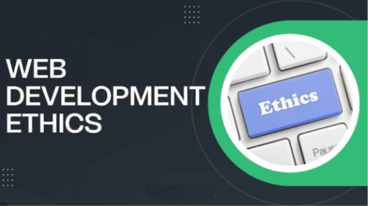Introduction
The rapid rise of technology has made web development a cornerstone of modern business, education, and daily life. However, as the web expands, ethical dilemmas arise—from privacy concerns and data misuse to accessibility issues and security risks. Ethical web development is not just a trend; it’s essential for building trust and ensuring a positive user experience. This blog will delve into the role of ethics in web development, covering key areas like user privacy, accessibility, transparency, and security.
Why Ethics Matter in Web Development
Ethical web development aims to create websites and applications that are honest, fair, and beneficial to users. Here’s why ethics should be a priority for every developer and business:
- Trust-Building: Users are more likely to trust websites that handle their data responsibly and prioritize their well-being.
- Compliance: Following ethical practices helps businesses comply with regulations like GDPR, CCPA, and ADA, avoiding potential legal consequences.
- Positive Brand Image: Ethical practices contribute to a reputable and user-centered brand, improving customer loyalty.
- Long-Term Success: Ethical foundations set the stage for long-term growth by fostering sustainable user relationships.
Key Ethical Principles in Web Development
Below are some core ethical areas developers should focus on to ensure they are creating fair and responsible digital experiences:
1. Privacy and Data Protection
Privacy is a significant ethical concern in web development. Here are some guidelines for handling user data responsibly:
- Data Minimization: Only collect the information necessary for functionality and avoid gathering excessive or intrusive details.
- Transparency: Be upfront about data usage and obtain clear consent before collecting or processing personal information.
- Secure Storage: Use encryption and other security measures to protect stored data from unauthorized access.
- Deletion and Accessibility: Allow users to delete their data or view how it’s being used, giving them control over their personal information.
2. Accessibility for All Users
Creating an accessible website ensures that people of all abilities can interact with your site. Accessible design benefits everyone and demonstrates a commitment to inclusivity:
- Visual Accessibility: Use alt text for images, provide color contrast, and design for screen readers to make websites easier for visually impaired users.
- Keyboard Navigation: Ensure that all functions can be accessed using a keyboard, catering to users who may have mobility issues.
- Content Clarity: Write clear, concise text and provide subtitles for videos to make content easily understandable.
3. Transparency and Honesty
Web developers should be honest about how their site functions and any costs or risks associated with using it. Transparency fosters a trustworthy environment for users:
- Clear Terms and Conditions: Avoid using complex legal jargon. Explain terms in straightforward language to make it easy for users to understand their rights and obligations.
- Avoid Dark Patterns: Design patterns that trick users, such as hiding subscription fees or making it hard to opt out, are unethical. Strive to create user-friendly designs that allow for easy navigation and decision-making.
4. Security and Protection Against Cyber Threats
Ethical web development involves protecting users from potential security threats by implementing secure coding practices:
- Data Encryption: Encrypt sensitive data like payment information and personal details to safeguard against hacking attempts.
- Regular Security Audits: Conduct regular security checks to identify and patch vulnerabilities.
- User Education: Provide users with safety tips, such as avoiding suspicious links and creating strong passwords.
5. Content Responsibility
Developers play a role in the type of content displayed on a site. Ethical web development involves curating content to promote a safe and positive user experience:
- Fact-Checking: Avoid sharing or promoting misleading or false information.
- Content Moderation: Implement tools to filter out hate speech, harmful content, or inappropriate material.
- Fair Representation: Make sure your site and its imagery reflect diversity and avoid reinforcing stereotypes.
Real-World Examples of Ethical Web Development
- Apple’s Approach to Privacy: Apple has made privacy a core component of its business model, giving users control over data collection and integrating privacy features into its design.
- Accessible Design in Government Websites: Government websites often follow strict accessibility standards, such as using plain language and supporting screen readers, to serve all citizens inclusively.
- Inclusive E-commerce Platforms: Some e-commerce sites incorporate transparent checkout processes, no hidden fees, and secure payment gateways to ensure a trustworthy experience.
The Business Case for Ethical Web Development
Ethical practices in web development aren’t just about doing the right thing—they can drive business success. By following ethical standards, businesses:
- Enhance Brand Loyalty: Users who trust a brand are more likely to return and recommend it to others.
- Reduce Legal Risks: Compliance with data and accessibility regulations protects companies from costly legal actions.
- Boost SEO Rankings: Google and other search engines favor accessible, user-friendly sites, which can improve search rankings.
Benefits of Ethical Web Development for Businesses
Embracing ethical web development practices isn’t just beneficial for users—it also strengthens businesses in several ways:
- Enhanced Brand Loyalty: Users are more likely to stay loyal to brands they can trust, leading to repeat customers and positive word-of-mouth.
- Legal Protection: Ethical practices often align with legal regulations, reducing the risk of costly lawsuits and fines.
- SEO Advantages: Search engines like Google reward accessible, user-friendly sites, which can improve search engine rankings and visibility.
- Competitive Advantage: By adopting ethical principles, businesses can differentiate themselves from competitors, especially in markets where user trust is paramount.
Conclusion
Ethics in web development isn’t just a checkbox—it’s a fundamental aspect of creating a user-centered, secure, and inclusive digital environment. By respecting privacy, prioritizing accessibility, ensuring transparency, and focusing on security, developers can foster trust, support inclusivity, and build a more positive online experience for everyone. Embracing these practices doesn’t just protect users; it strengthens businesses in the long run.
Is your website built on ethical foundations? Contact MDA Websites to learn more about how we can help you create a site that respects your users and aligns with the latest ethical standards.
